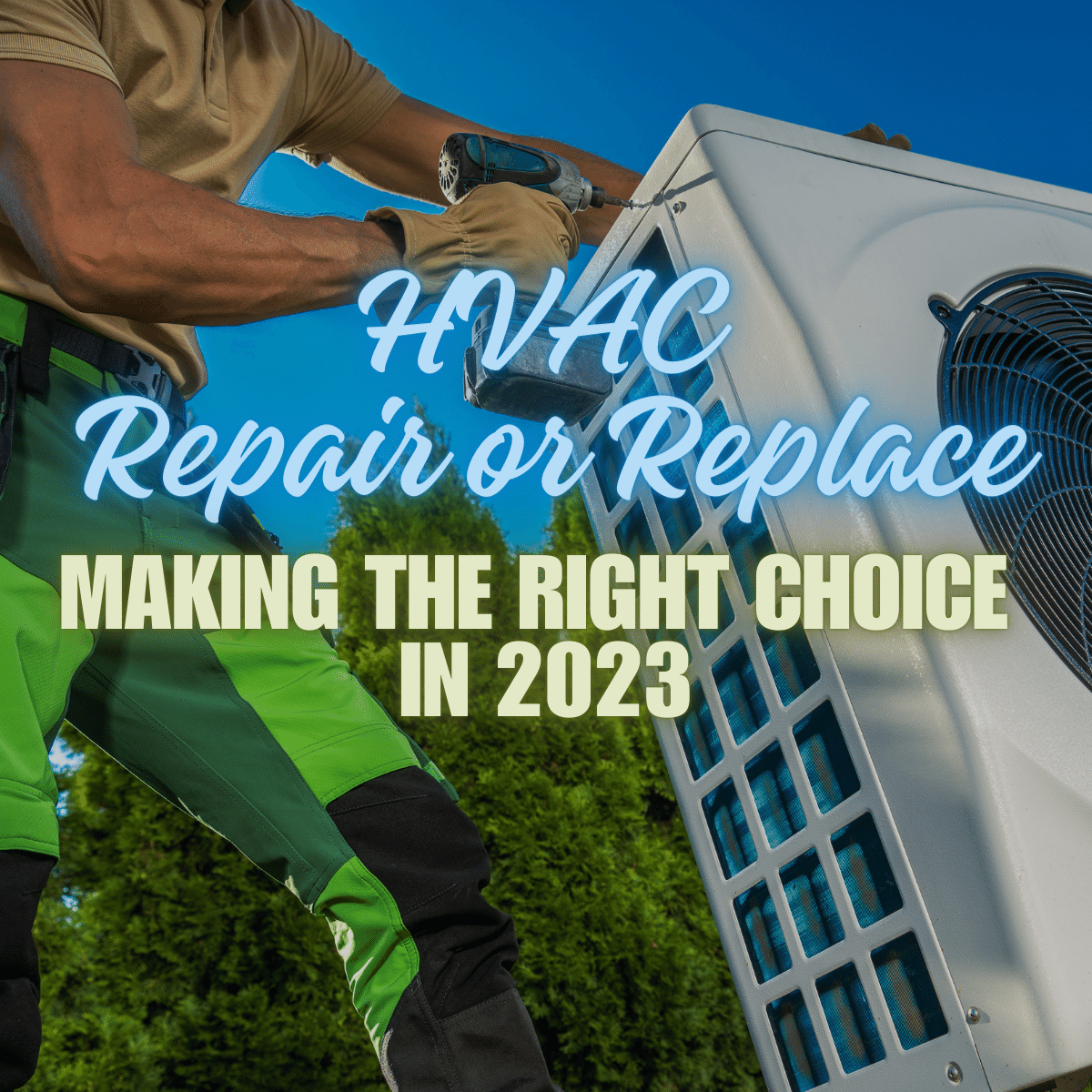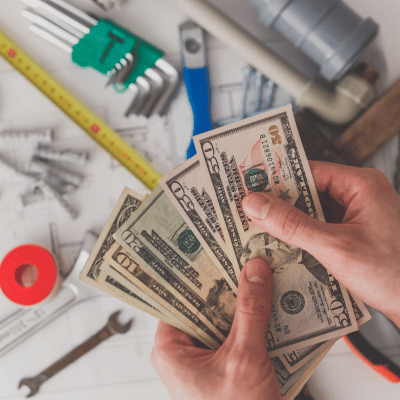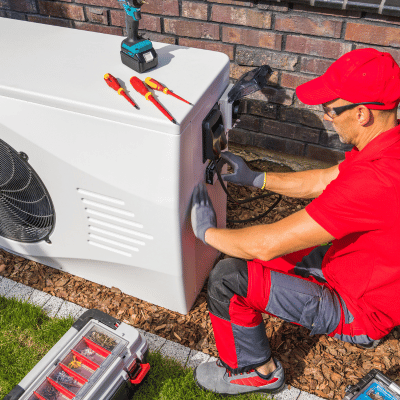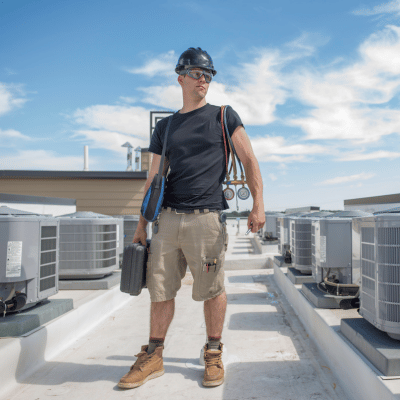HVAC Repair or Replace: Making the Right Choice in 2023
Oct 26, 2023

Is your air conditioner struggling to keep up with the sweltering summer heat, leaving you to ponder whether it’s time for an HVAC repair or replace? You’re not alone. Homeowners often face this dilemma, unsure of which option is the most cost-effective and efficient. In this blog post, we’ll guide you through the factors to consider and the benefits of upgrading your HVAC system, helping you make an informed decision.
Key Takeaways
- Deciding to repair or replace an HVAC system should be based on factors such as age, efficiency, cost of repairs vs. replacement, maintenance history and environmental impact.
- Upgrading to a more energy efficient unit can lead to significant energy savings and increased home value. It is important to recognize signs that may indicate the need for replacement due to safety concerns.
- Consulting with an experienced HVAC professional provides tailored recommendations for repair or replacement best suited for individual needs.
Factors to Consider: Repair or Replace

A number of factors come into play when deciding whether to repair or replace your HVAC system. These factors include:
- The system’s age
- Efficiency
- Repair costs
- Maintenance history
- Environmental impact of the air conditioning unit
A thorough evaluation of these factors can guide you towards the most cost-effective and efficient solution for your home.
Age of the System
The age of your HVAC system plays a significant role in determining whether to repair or replace it. The average lifespan of an air conditioning compressor in an AC system is 12-20+ years. It is advisable, as per Energy.gov, to seek advice from an HVAC technician before deciding to replace heat pumps and air conditioners that have completed ten years or more, or furnaces that are 15 or more years old. This is to ensure the most effective and efficient replacement possible. The longevity of an air conditioner also depends on the quality of the initial installation and the degree of maintenance it has received. When the estimated repair bill approaches 50% of the system’s value and the system is over ten years old, replacement becomes the more sensible option. The risk of more costly repairs and decreased efficiency increases with the unit’s age, making replacement a cost-effective choice in the long run.
Efficiency and Energy Savings

The efficiency of your HVAC system is a significant consideration in the repair versus replace decision. Older HVAC units tend to be less efficient due to wear and tear and technological advancements in newer models. Upgrading to a more efficient HVAC unit can lead to significant energy savings and reduced utility bills. The seasonal energy efficiency ratio (SEER) rating is used to gauge the efficiency of air conditioning units. SEER rating is an indication for the energy-efficiency of a system.
The higher the SEER, the greater its energy-saving potential. A shift from an older unit with a lower SEER rating to a newer model boasting a higher rating could result in annual cooling cost savings of up to 68%. Additionally, more efficient HVAC systems often provide better temperature control, improved airflow, and advanced features like smart thermostats for enhanced comfort.
Cost of Repairs vs. Replacement
Comparing the cost of repairs to the cost of a new system can help homeowners make an informed decision on whether to repair or replace their HVAC system. HVAC professionals use the “5,000 rule” as a general guideline to help determine the most cost-effective option. This rule states that if the age of the HVAC equipment multiplied by the repair cost is greater than $5,000, it is recommended that it be replaced. Conversely, if it is less than $5,000, it should be repaired. Estimating the repair cost and considering the unit’s age can help homeowners balance the immediate benefits of repair against the long-term savings offered by replacement with a more efficient model. In some cases, investing in a new system may be more cost-effective than continuing to repair an old, unreliable unit.
Maintenance History
A well-maintained HVAC system is more likely to require repairs rather than a full replacement, while a poorly maintained system may need to be replaced sooner. Proper maintenance includes:
- Cleaning or replacing air filters regularly
- Having a professional maintain the ducts
- Scheduling regular maintenance checks
- Checking the thermostat
- Lubricating moving parts
If your HVAC system has been well-maintained, you may be able to prolong its life with HVAC repair instead of investing in a new system. However, if the unit requires frequent repair work, it might be more cost-effective to replace it. Continuous operation of the air conditioning or heating system, a combination of new and old components, and inadequate installation can result in frequent repairs or premature breakdown of the system. Understanding how an air conditioner operates can help you identify potential issues and make informed decisions about repairs or replacement.
Environmental Impact
Replacing an outdated HVAC system with a more environmentally friendly option can have several benefits, including:
- Reducing energy consumption and carbon emissions
- Avoiding the use of harmful refrigerants like R-22, which contribute to ozone depletion
- Utilizing newer systems that use more environmentally-friendly refrigerants like R410A
By making this upgrade, you can not only improve the efficiency of your HVAC system but also contribute to a healthier and more sustainable environment. Choosing a more eco-friendly model for your HVAC system upgrade can help you cut down on energy costs while also making a positive contribution towards a greener planet. Additionally, you may be eligible for financial incentives and rebates from manufacturers and local utility companies for installing a more energy-efficient system.
Upgrading Your HVAC System: Benefits and Incentives

Upgrading your HVAC system can provide numerous benefits, including improved performance and comfort, financial incentives and rebates, and increased home value. By investing in a new, more efficient system, you can experience enhanced temperature control, reduced operational noise, and advanced features like smart thermostats. Financial incentives such as tax credits and rebates can make buying a new HVAC system, like a heat pump, attractive.
Repairing an older one may become less desirable even if it is the cheaper option. For example, the High-Efficiency Electric Home Rebate Act (HEEHRA) offers substantial rebates for heat pumps, making it more cost-effective for homeowners to upgrade their HVAC systems. Additionally, replacing an old HVAC system can increase your home’s value, particularly if you plan to sell in the near future.
Improved Performance and Comfort
Newer HVAC systems offer better performance and comfort than older models, providing cool air with improved temperature control, reduced operational noise, and advanced features like smart thermostats for enhanced comfort. The quieter operation of newer systems is due to the scroll compressor used in newer units, which produces a distinct sound in comparison to the reciprocating compressors found in older models. These improvements contribute to a more efficient cooling system. Smart thermostats in newer HVAC systems possess advanced features such as:
- Temperature balancing
- Schedule programming
- Remote control
- Learning algorithms
- Energy usage information
These features can help homeowners maintain a comfortable living environment while also reducing their energy consumption and costs.
Financial Incentives and Rebates

Financial incentives such as tax credits and rebates can make the acquisition of a new HVAC system more appealing than repairing an older one. The High-Efficiency Electric Home Rebate Act (HEEHRA) is a legislation that offers considerable rebates for heat pumps. For households with incomes 80% below the area’s median income, the maximum rebate is 100% up to $8,000.
For households with incomes between 81-150% of the area’s median income, the rebate is up to 50% of the heat pump’s cost, respectively. By taking advantage of these incentives, homeowners can reduce the initial cost of purchasing and installing a new HVAC system, making it more economical and cost-effective in the long run.
It is important to bear in mind that these incentives and rebates may alter regularly, so it is prudent to consult with relevant government agencies or utility companies to obtain the most up-to-date information.
Increased Home Value
Replacing an old HVAC system can increase a home’s value, especially if the homeowner plans to sell in the near future. Studies have demonstrated that homes with energy-efficient HVAC units tend to be more sought after in the real estate market, and may fetch higher prices. Furthermore, a well-maintained and energy-efficient HVAC system can attract more prospective buyers, resulting in a higher sale price for the property. The installation of a new HVAC system can increase the value of your home by an estimated $5,000 to $20,000. By upgrading your HVAC system before selling your home, you can not only enhance the comfort and performance of your home but also potentially increase its resale value.
Signs It’s Time to Replace Your HVAC System

Understanding the right time to replace your HVAC system is key to maintaining home comfort and energy efficiency. Signs that it’s time to replace your HVAC system include frequent breakdowns and repairs, rising energy bills, and safety concerns.
Recognizing these signs can guide you in making an informed decision about whether to repair or replace your HVAC system, resulting in optimal home comfort and performance.
Frequent Breakdowns and Repairs
Frequent repairs may indicate that an HVAC system is losing efficiency and that a replacement is a more cost-effective option. The costs of HVAC repairs can vary depending on the severity of the damage and the specific repair required. Generally, HVAC repairs can range from $100 to $1,200 for basic repairs. More extensive repairs or replacements, such as air compressor replacement, can cost between $1,350 and $2,300. Routine maintenance and timely addressing of repairs can help prevent major malfunctions and expensive repairs. However, disregarding repairs or postponing them can result in more extensive damage and higher repair costs in the future. It is suggested to arrange HVAC maintenance at least once a year to keep the system functioning efficiently and reduce the possibility of unanticipated breakdowns.
Rising Energy Bills
Rising energy bills can be a sign of an inefficient HVAC system, and upgrading to a more efficient model can help lower cooling costs. The energy efficiency of an HVAC system can be impacted by several factors, including the unit’s age, maintenance history, and overall performance. Upgrading to a newer, more efficient system introduces benefits such as enhanced temperature control, quieter operation, and innovative features like smart thermostats for superior comfort. In addition to the benefits of improved performance and comfort, upgrading to a more efficient HVAC system can also result in significant energy savings and reduced utility bills. By closely monitoring your energy bills and addressing any noticeable increases in costs, you can determine whether it’s time to invest in a new, more efficient HVAC system.
Safety Concerns
Safety concerns, such as carbon monoxide leaks or fire hazards, may necessitate the replacement of an HVAC system. A fractured heat exchanger on a furnace, for example, could result in a toxic carbon monoxide leak, posing a serious health risk to the occupants of the home. An HVAC system may also present a fire hazard due to electrical issues, excessive system operation resulting in overheating, inadequate lubrication of motor bearings, leaky fuel lines, and accumulation of dirt causing overheating. Promptly addressing safety concerns and investing in a new, more efficient HVAC system not only safeguards your family’s well-being but also allows you to enjoy improved performance and energy efficiency.
Consult an HVAC Professional

Consulting an HVAC professional can provide expert assessment and custom recommendations for repairing or replacing an HVAC system. An HVAC professional can evaluate the condition of your system, taking into account factors such as:
- Age
- Efficiency
- Repair costs
- Maintenance history
This assessment will help you decide whether to repair or replace your HVAC system. Seeking professional advice can help you make the most suitable decision catering to your home’s unique needs and budget.
Expert Assessment
An HVAC professional can evaluate the condition of a system and help homeowners decide whether to repair or replace it. By conducting a thorough assessment of the system and considering factors such as:
- inconsistent temperature
- strange sounds or smells
- poor airflow
- high energy consumption
- frequent breakdowns
An HVAC professional can provide valuable insights and recommendations. In addition to their expert assessment, an HVAC professional should possess the necessary qualifications to competently assess an HVAC system, such as:
- An HVAC license
- EPA 608 Certification
- NATE Certification
- HVAC Excellence Certification
By consulting a qualified HVAC professional, you can be confident in the recommendations provided and make an informed decision about your HVAC system.
Custom Recommendations

Custom recommendations from an HVAC professional can ensure that homeowners choose the right system for their needs and budget. By gaining insight into the client’s energy consumption patterns, ascertaining their goals and preferences, and posing pertinent questions to assess their needs, HVAC professionals can tailor their recommendations to suit the client’s unique requirements. Some examples of custom recommendations an HVAC professional might make include:
- Conducting a manual J load calculation
- Performing a home performance assessment
- Analyzing ductwork and conducting airflow testing
- Providing personalized customer service
- Employing custom service stickers
- Offering tailored maintenance plans
These custom recommendations can help ensure that the homeowner selects the most suitable HVAC system for their specific needs, lifestyle, and budget.
Summary
In conclusion, deciding whether to repair or replace your HVAC system can be a daunting task. By considering factors such as age, efficiency, repair costs, maintenance history, and environmental impact, you can make an informed decision that best suits your needs and budget. Consulting an HVAC professional for expert assessment and custom recommendations can further ensure that you choose the right system for your home. Ultimately, investing in a new, more efficient HVAC system can improve performance and comfort, reduce energy costs, and increase the value of your home.
Frequently Asked Questions

Is it worth fixing a 20 year old AC unit?
Given that most 20-year-old HVAC systems are at the end of their life span and it does not make financial sense to fix an old car, it is wise to buy a new air conditioner rather than fixing a unit older than 15-20 years.
Should I replace my HVAC if it still works?
Based on the average lifespan of an HVAC unit, if your system is over 10 years old you should consider replacing it as it may be less efficient and costing you extra money.
How often should an HVAC system be replaced?
On average, an HVAC system should be replaced every 15 years, depending on how well it was installed and taken care of.
What time of year is cheapest to replace HVAC?
The best time to replace your HVAC system is in the early spring or early fall, particularly in September before you start relying on it for the winter. Prices are typically higher during the middle of winter and summer due to increased demand.
How do I fix my HVAC system?
To fix your HVAC system, thoroughly clean your system if the problem is a dirty air filter or blocked condenser unit. Check your thermostat settings and air filter for obstructions, remove ice build-up, clear space around the compressor, and inspect all ducts and evaporator coils. Lastly, verify that the power and furnace door are on, check all wires, and reset your system.


